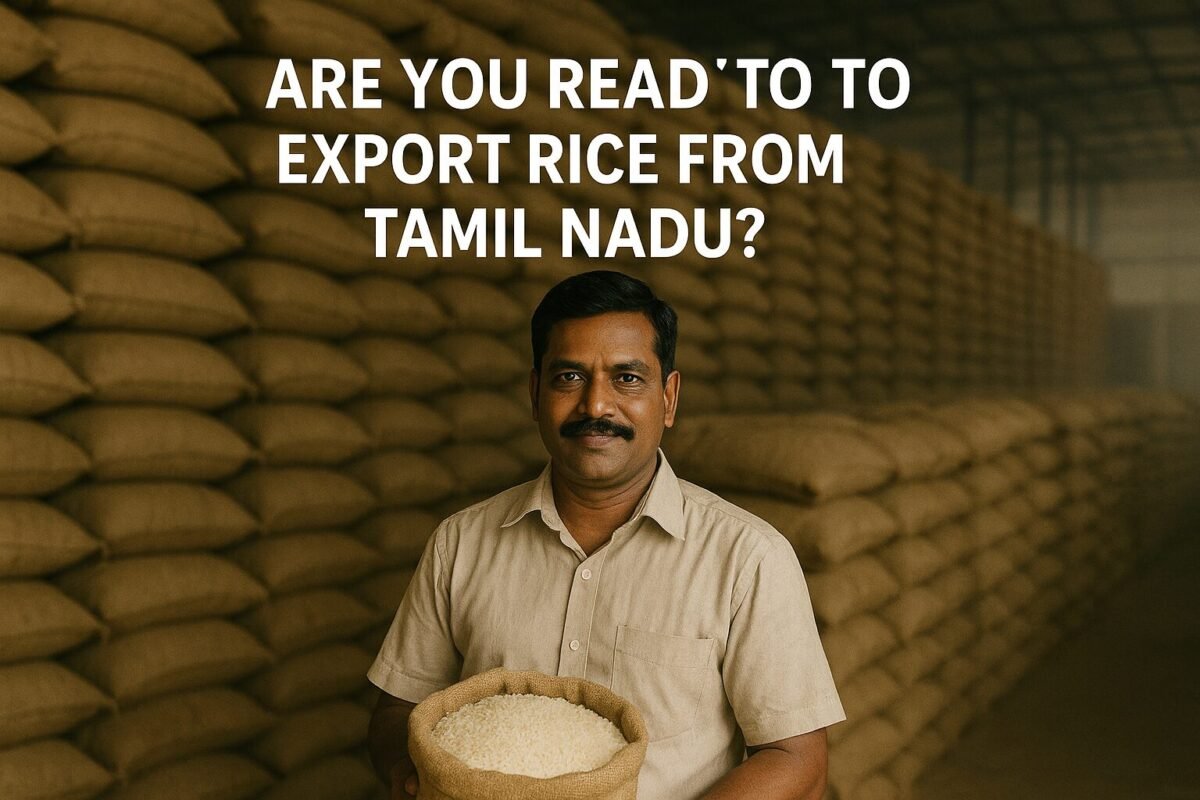
Are You Ready to Export Rice from Tamil Nadu?
Tamil Nadu is one of India’s most important rice-producing states, blessed with fertile soil, advanced irrigation systems, and skilled farming communities. From fragrant Ponni to long-grain Basmati and parboiled varieties, the state produces rice that is loved both locally and internationally. In recent years, the global appetite for Indian rice has grown significantly, creating lucrative opportunities for those who are ready to step into the export business.
If you’ve ever considered entering the export market, the question you should be asking yourself is: Are you ready to export rice from Tamil Nadu? While it may sound straightforward, exporting rice involves much more than simply sourcing and shipping the product. It requires planning, legal compliance, market research, and building a reliable supply chain.
Why Export Rice from Tamil Nadu?
Tamil Nadu’s rice is valued for its taste, texture, and quality. Certain varieties, like Ponni, are especially popular in countries with a large South Indian diaspora. Basmati rice grown in select regions of Tamil Nadu is also in demand in premium markets like the USA, Canada, and Europe.
The state also enjoys logistical advantages. With major ports such as Chennai, Ennore, and Tuticorin, exporters can ship products to almost any part of the world efficiently. This accessibility reduces shipping costs and delivery times, making Tamil Nadu an attractive base for rice exports.
Global Demand for Tamil Nadu Rice
The demand for Indian rice is particularly strong in:
- Middle East: Prefers parboiled and long-grain white rice.
- Africa: Bulk buyers of non-basmati and parboiled rice.
- North America & Europe: Niche markets for Basmati and organic rice.
- Asian Countries: Demand for specialty and fragrant varieties.
The rising popularity of Indian cuisine worldwide, along with health-conscious trends toward natural and unprocessed foods, has further fueled the demand for rice exports.
Steps to Start Rice Exports from Tamil Nadu
1. Register Your Business and Obtain Licenses
Before you start, ensure your business is legally registered. You will need:
- Importer Exporter Code (IEC) from DGFT.
- Registration with APEDA (Agricultural and Processed Food Products Export Development Authority).
- GST registration.
These certifications are mandatory and help you operate legally in the export market.
2. Select the Right Rice Variety for Your Market
Your choice of rice depends on your target region. For instance:
- Ponni rice for Singapore, Malaysia, and Sri Lanka.
- Basmati for premium markets in the Middle East, USA, and UK.
- Parboiled rice for African countries.
Researching your buyers’ preferences is key to successful exports.
3. Maintain Quality Standards
International buyers expect consistent quality. You must:
- Test for moisture content, broken grains, and impurities.
- Follow packaging and labeling regulations for each country.
- Use hygienic milling and storage facilities.
Quality control builds trust and ensures repeat orders.
4. Packaging and Branding
Packaging plays a big role in attracting buyers and maintaining product freshness. Common choices include 5kg, 10kg, and 25kg moisture-proof bags. Exporters are also moving toward eco-friendly packaging to meet international sustainability trends.
5. Finding Reliable Buyers
You can connect with potential buyers through:
- B2B trade portals like Alibaba, TradeIndia, and Global Sources.
- International food trade fairs and exhibitions.
- Direct outreach through export promotion councils.
6. Arrange Shipping and Logistics
Rice is generally exported via sea freight. For large orders, choose Full Container Load (FCL); for smaller orders, opt for Less than Container Load (LCL). Always ensure fumigation and inspection certificates are ready before shipment.
Challenges in Rice Exporting from Tamil Nadu
While the market is promising, exporters must be prepared for challenges:
- Price Fluctuations: Global rice prices change based on demand and supply.
- Strict Import Rules: Each country has its own set of import regulations.
- Quality Compliance: Failure to meet standards can lead to shipment rejection.
- Currency Fluctuations: Changes in exchange rates can affect profits.
Overcoming these challenges requires careful planning, risk management, and staying informed about market trends.
Tips for Successful Rice Exporting
- Build Strong Relationships with Farmers – Partnering with reliable suppliers ensures steady quality and supply.
- Stay Updated with Global Trends – Watch for changes in consumption habits and trade policies.
- Invest in Branding – Strong branding helps differentiate your product in competitive markets.
- Offer Flexible Quantities – Cater to both bulk buyers and smaller retailers.
The Future of Rice Exports from Tamil Nadu
Global rice consumption is expected to rise steadily, particularly in developing nations. Tamil Nadu, with its agricultural heritage and port connectivity, is well-positioned to benefit from this growth. Additionally, increasing demand for organic and specialty rice opens new niche markets for exporters willing to innovate.
Conclusion
So, are you ready to export rice from Tamil Nadu? With the right strategy, commitment to quality, and strong buyer connections, the rice export business can be both profitable and sustainable. The global market is waiting, and Tamil Nadu has everything it takes—from fertile fields to efficient ports—to help you succeed.
If you prepare well, understand your target market, and build a reliable network, you’ll not only make a mark in the international rice trade but also contribute to showcasing Tamil Nadu’s agricultural excellence worldwide.









